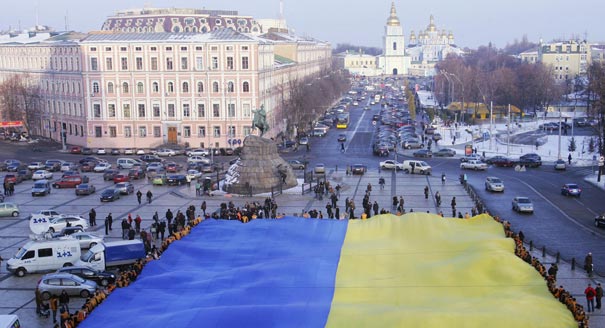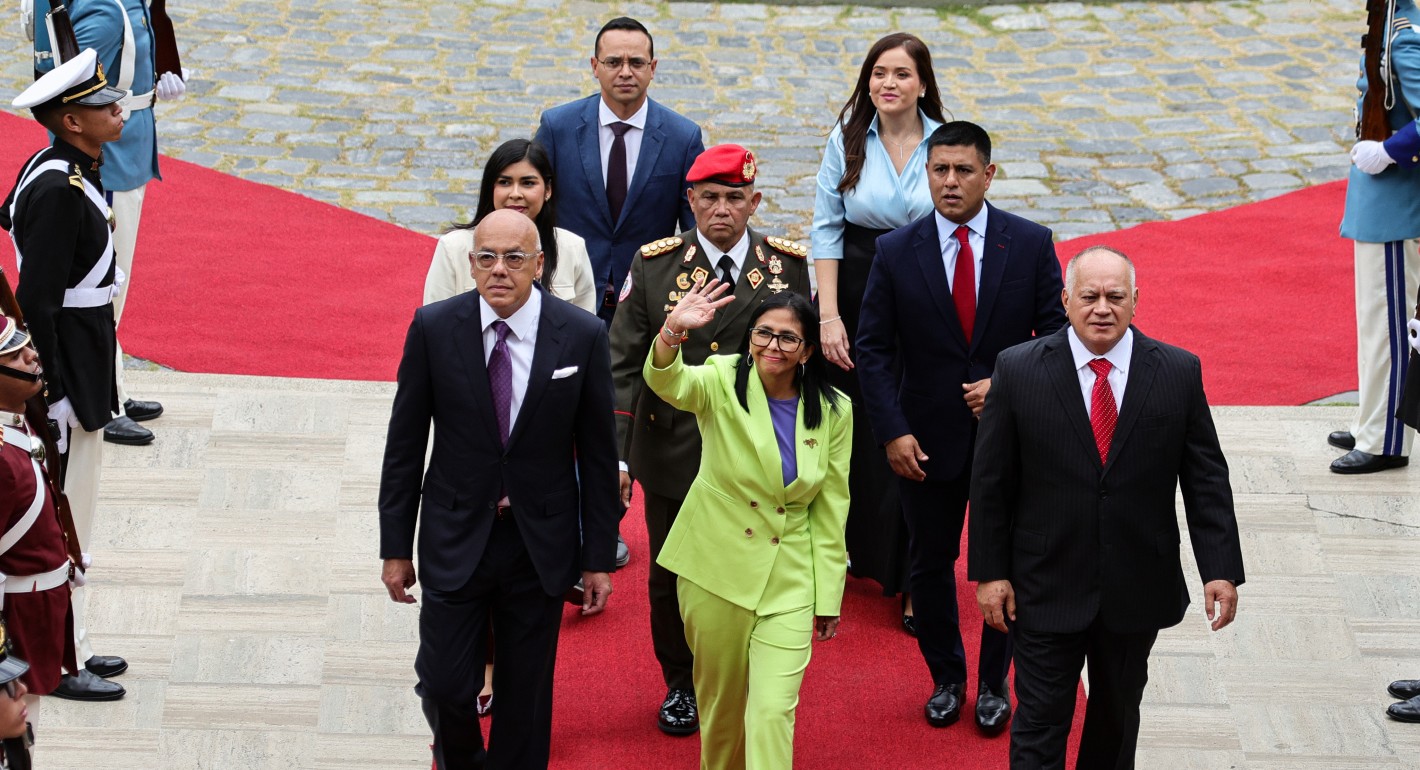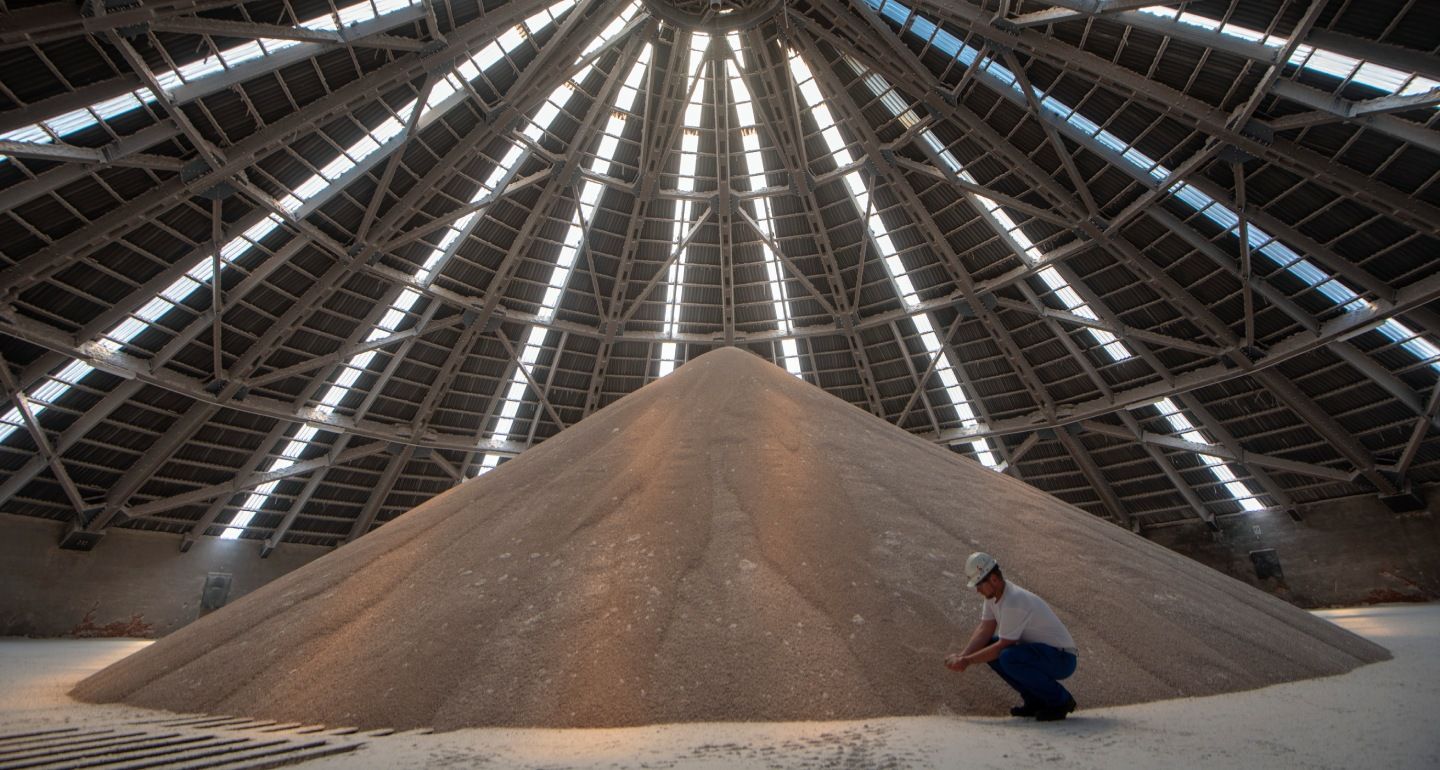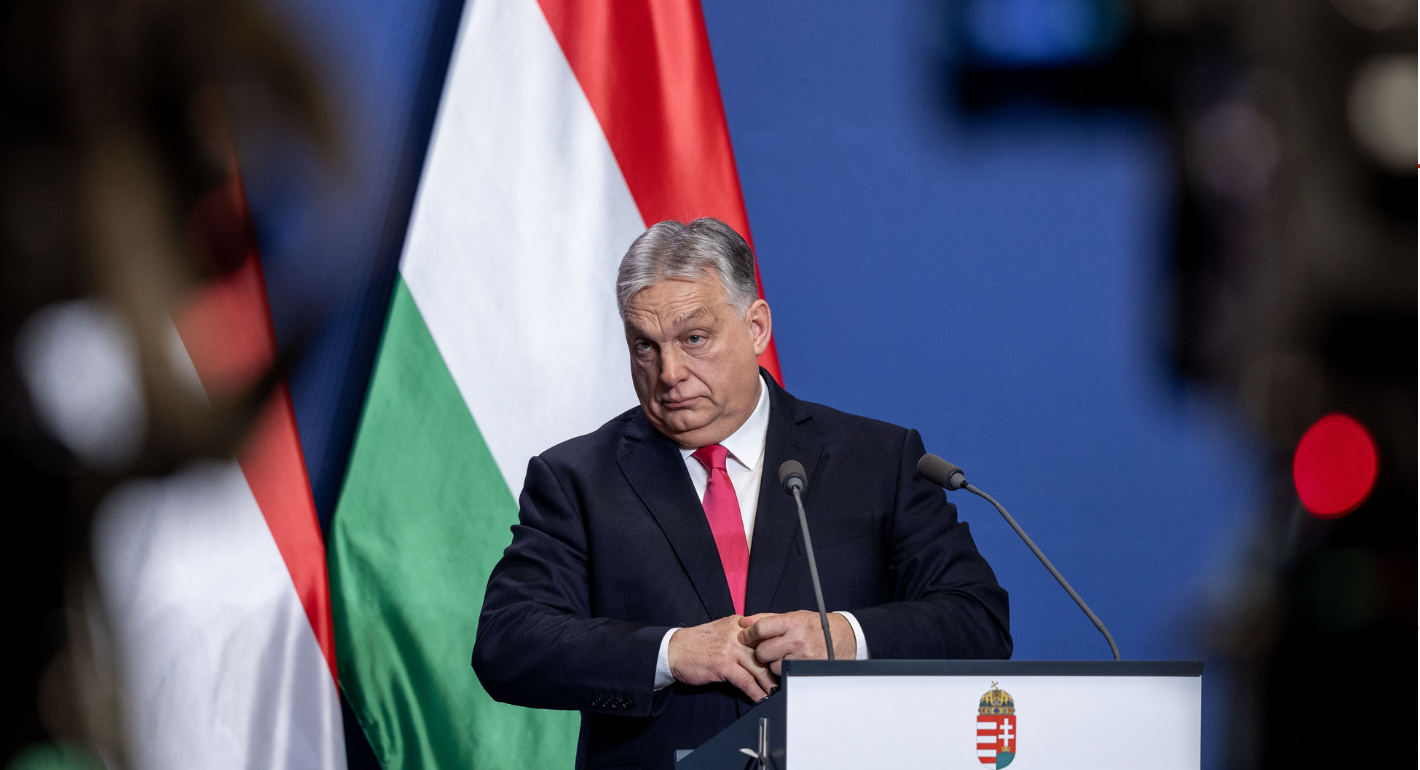The October 11 verdict in the trial of Yulia Tymoshenko, widely perceived to be politically motivated, has shaken the relationship between Ukraine and the European Union. President Yanukovych’s October 20 visit to Brussels was indefinitely postponed and the future of negotiations on an Association Agreement with the EU now seems uncertain.
In a new Q&A, Olga Shumylo-Tapiola argues that Ukraine is now at a crossroad and must choose whether to move closer toward the EU or continue on its current path. While Yanukovych expects the EU to back down, the EU should not be afraid of alienating Kyiv—a move toward Moscow is not in Ukraine’s interest.
How serious is Ukraine’s leadership about further integration with the EU?
While Ukraine’s leadership continues to emphasize the importance of the country’s alignment with Europe, recent domestic developments—especially Tymoshenko’s trial and those of former members of her government—paint a very different picture. Moreover, Ukraine did not just recently start on the path away from Western values and practices. The country’s downward trajectory began some time ago, as evident by examples like the overhaul of the constitution by the Constitutional Court in 2010, the enactment of questionable legislation for local elections in 2011, attacks against journalists, public figures, and NGOs, and the implementation of reforms that were designed to strengthen the vertical power structure and ensure a “stability” void of any political competition. The prosecution of members of the former government—and the ways these cases are being tried—was merely the proverbial “straw that broke the camel’s back.”
Yanukovych speaks of Ukraine’s European vocation and demands the prospect of EU membership, but he does not understand European values. Yanukovych sees European integration as a symbol rather than a practical means of adopting European rules and norms. He believes that pro-European rhetoric may win him votes at home, but ultimately doubts that the EU is serious about values. Lastly, rhetoric on Europe is used as a bargaining tool with Russia, in gas deals or any other instance where it may be beneficial to the president and his entourage.
Alignment with Europe is not a geostrategic choice, but a corporate one. However, the ideal scenario for Yanukovych would be for Ukraine to hover in a grey zone between the EU and Russia. If forced to choose, though, the president would much rather opt for partnership with the EU.
Very little strategic thinking goes on in Kyiv, and Yanukovych and his entourage of oligarchs do not see Brussels as a threat to their short term interests. They tend to believe that it will take Ukraine decades to adopt EU rules and norms, which could constrain their activities. Russia, on the other hand, is seen as a threatening partner. Membership in Moscow’s customs union, which entails the risk of losing economic and political power over Ukraine, goes completely against the interests of the ruling elite.
What is the current state of negotiations between the EU and Ukraine on the Association Agreement?
Kyiv and Brussels have been negotiating an Association Agreement (AA) that would lead to a political association between the two partners and economically integrate Ukraine with the EU. This new agreement was intended to supersede the 1998 Partnership and Cooperation Agreement that Ukraine—like many other former Soviet republics—had concluded with the EU. In the absence of the prospect of membership for Ukraine, the AA was intended to bring the country closer to the EU by obliging it to adopt the Union’s norms, standards, and practices in a wide range of areas.
Negotiations on the AA began in 2007 and were followed a year later by talks on a Deep and Comprehensive Free Trade Area (DCFTA), which were launched upon Ukraine’s accession to the World Trade Organization. Both the EU and Ukraine expected to conclude the negotiations by the end of 2011 to coincide with the initialing of the AA at the EU-Ukraine Summit in December. The EU held up its end of the bargain with Ukraine, finalizing talks on sectorial and economic cooperation, as well as the DCFTA, last week. However, the very future of the agreement, and of EU-Ukraine relations themselves, is in serious jeopardy at the moment. The direction the relationship takes now depends solely on the Ukrainian leadership’s political will. Two issues are standing in the way of the finalization of negotiations.
First, all members of Ukraine’s previous government who are being prosecuted on political grounds have to be released and rehabilitated and those who wish to participate in the 2012 parliamentary elections should be allowed to do so. The message from Brussels and other EU capitals is simple—Ukraine must return to following democratic norms if it wishes to strengthen its ties to the EU through the AA. Former prime minister Tymoshenko recently wrote a letter in support of the completion of talks on the AA. This may help shift the EU’s attitude towards Ukraine, and may even lead to the signing of the agreement. However, if Ukraine does not meet EU commitments—and continues prosecuting Tymoshenko and her allies—the agreement is unlikely to get the endorsement it needs from all member states for ratification.
Two, Ukraine is now insisting that the prospect of eventual membership is included in the preamble of the new agreement. From a European standpoint, several factors dictate against this. Experts have argued that from a legal standpoint an AA would be the wrong place to include the prospect of membership. Nor is there a precedent for such a measure—Poland and other 2004 enlargement countries did not have similar clauses included in their AAs. Moreover, the current climate—in which Ukraine’s democratic credibility has suffered and the EU is undergoing a serious economic crisis and is wary of further enlargement—is not conducive to discussing the possibility of eventual membership. Kyiv, however, is refusing to accept these arguments.
This sends a mixed signal to the EU and makes many within the Union question the Ukrainian leadership’s seriousness when it comes to Europe. Ukrainian politicians have fixated on the possibility of EU membership for years. However, bringing it to the table now—knowing that EU’s response will be negative—may be an attempt to prove to the Ukrainian public that the EU is rejecting the country, which would allow the administration to blame Europe for the lack of progress in negotiations.
How did Ukrainians react to the verdict in Yulia Tymoshenko’s trial?
The reaction to the verdict in Ukraine was very mixed. The majority of Ukrainians understand that the prosecution of Tymoshenko was politically motivated and there is a segment of the population that feels threatened by this. They assume that if high-level politicians and bureaucrats can be prosecuted, the same can happen to ordinary people.
Others are indifferent, seeing the trial against Tymoshenko as little more than a case of rival political clans settling scores. This mood is heavily influenced by a general sense of disillusionment with the Orange Revolution and the inability of its leaders—Tymoshenko being one of them—to deliver reforms and improve people’s lives. This group tends to be disenchanted with politics and politicians and feels that Tymoshenko got what she deserved.
The debate on the Tymoshenko verdict and its impact on the EU-Ukraine relations is ongoing. According to the latest opinion poll by the Kyiv branch of market research company GfK, of the 90 percent of Ukrainians who knew about the Tymoshenko verdict, 58 percent felt it was unreasonable and 50 percent thought that the president and his administration had pressured the court to reach the verdict.
However, even if the majority of the population supports Tymoshenko—or at very least sympathizes because of the political nature of her trial—a public uprising is highly unlikely. The opposition only mustered 5,000 protestors on the day of the verdict. The public is likely to remain disenchanted by the actions of the authorities, but no immediate mass protest should be expected.
How did the European Union react?
The reaction within the EU will likely have a significant impact on EU-Ukraine relations.
The EU’s response to the latest developments in Kyiv has been unexpectedly strong and coherent. Catherine Ashton, EU high representative for foreign affairs and security policy, and the foreign ministers of a number of EU member states came out with statements unequivocally condemning the verdict and President Yanukovych’s October 20 visit to Brussels was postponed. On October 27, the European Parliament adopted a resolution on Ukraine that keeps the door for further relations with the country open, provided that it embraces democratic standards. Coupled with the possibility to postpone the EU-Ukraine summit in December and the doubts now surrounding the future of the AA, the EU sent a clear message to Ukraine.
The Yanukovych administration, however, still sees the EU as a soft partner who wants Ukraine more than Ukraine wants the EU. They believe that the EU is afraid of losing Ukraine to Russia and its customs union. Kyiv ultimately expects the EU to back down.
Kyiv has twice already attempted to convince Ukrainians that the EU is not ready to ratify the AA due to the Union’s internal problems and that the Brussels is only pressuring Ukraine to solve the Tymoshenko case because of the former prime minister’s personal ties to EU politicians. Officials have also made the argument that the EU will make the Ukrainian population pay—by imposing travel restrictions for example—if the government does not follow EU guidelines.
This propaganda is unlikely to have much effect on the general public. Ukrainians, though, are equally unlikely to take to the streets to protest against the deterioration in relations with Europe that will result from the authorities’ inability to put the country back on the path to democracy.
Ultimately, despite the strength and coherence of its current stance, the EU did little to stop the backsliding of democracy in Ukraine. It is now apparent that the Union should have adopted a clearer stance when the first signs of deterioration became visible.
What options does Ukraine have following the verdict? How will the country’s choices affect relations with its neighbors?
Ukraine is now standing at a crossroad. It has two scenarios to choose from.
The first scenario would be for the country to finally adopt the European values it declares it shares, including respect for human rights, freedom of the press, and an independent judiciary. An initial gesture in this regard would be to release and rehabilitate all those prosecuted and imprisoned on political grounds. In addition, opposition leaders such as Tymoshenko and former interior minister Yuri Lutsenko should be allowed to participate in the upcoming 2012 parliamentary and 2015 presidential elections.
Ukraine needs to return to the reality that reigned in the country prior to Tymoshenko’s trial. This could be achieved if parliament adopts amendments to the country’s criminal code that would offer politicians immunity from prosecution for decisions taken while in office. As of yet though, the parliament has not taken this step. Despite Yanukovych’s promises to EU leaders, Ukraine’s parliament has now twice failed to decriminalize the offences that the former prime minister was convicted of. This sends a clear signal that Kyiv is not ready to address the problem at hand.
Tymoshenko may still be released thanks to a motion her lawyers intend to file through the court of appeal. Any of the numerous breaches of procedure that mired Tymoshenko’s trial could be used as grounds for overturning the initial verdict. The court, which according to law has four months to review an appeal, should endeavor to review the case without delay and should be allowed to do so free of any political pressure. The prosecution of members of Tymoshenko’s former government, where based on political grounds, should cease immediately.
The second scenario Ukraine could opt for is to do nothing about Tymoshenko’s and others’ trials and indeed continue opening new criminal cases against the former prime minister—as happened shortly after the verdict in her first trial was announced.
This path would lead to isolation for Ukraine. Europe would, in all likelihood, finalize talks on the AA, but delay the initialing and ratification of the final document. Relations with Russia would not get easier either.
How much influence does the EU have in Ukraine?
Ukraine is an important country for the EU. A number of member states—as well as the Union itself—invested significant political capital in the country. Ukraine was, at one point, a role model for the EU’s Eastern Partnership (EaP) region. Some member states—Poland, Sweden, and a few others—would see the isolation of Ukraine as a personal defeat.
The EU, however, does not have too much leverage in Ukraine at the moment. The AA is perhaps its greatest source of influence. While the EU should keep the agreement on the table and leave open the possibility of ratification, it should not compromise its values if it wants to be taken seriously in Kyiv. Ratifying the agreement—even the component on a DCFTA—while Ukraine’s democracy is under assault will not motivate the country’s politicians to improve. It may simply give them yet another symbol to sell during elections.
There are calls from some EU capitals to restrict travel for the holders of Ukrainian diplomatic passports—all Ukrainian parliamentarians, diplomats and civil servants—by re-introducing Schengen zone visas. However, the abolition of visas for this category of passports was agreed in the reciprocal EU-Ukraine Visa Facilitation Agreement, so this measure is unlikely to be introduced. There are also calls—primarily by members of Germany’s parliament—to withdraw Ukraine’s right to host the Euro 2012 European Football Championship, but this is also unlikely. If the situation in Ukraine does not improve, however, EU leaders may well boycott the opening ceremony.
The effectiveness of any policy the EU adopts toward Ukraine will depend largely on the business losses it inflicts on Yanukovych, his partners, and their direct interests. The greater the loss, the greater the chance of resolving Tymoshenko’s case and the cases of others who have been prosecuted on political grounds. Europe would do well to keep in mind that public image issues—such as invitations to summits and other photo opportunities—are very important for Kyiv.
The EU will need to be careful with how it delivers messages to Ukraine, particularly if Yanukovych is invited to Brussels this month, or if the EU-Ukraine Summit, scheduled to be held in Kyiv on December 19, goes ahead. Domestically, Ukrainian authorities will try to sell either of these two scenarios as a great success in EU-Ukraine relations. They would interpret either as a symbol of the EU’s acquiescence with the recent developments in Ukraine. Similarly, if the AA is not signed during the summit, it will be presented as a result of the EU’s unwillingness to provide Ukraine with the prospect of eventual membership in the Union.
The EU should deliver a clear and unified message, outlining its serious concern about domestic developments in Ukraine at the summit and press conference. Brussels should explain to Ukraine’s population that any delays in ratifying the AA are a clear result of Kyiv’s policies. The EU’s language has to be direct, as this is the only tone Kyiv understands. The Union should not be afraid of alienating Ukraine and pushing the country into Russia’s arms—a move toward Moscow is not in the economic or political interests of the Ukrainian leadership. For its part, Kyiv needs to be aware that, despite the country’s importance, there are limits to how far the EU can let Ukraine go. If Kyiv proves unable to solve its problems with democracy, the EU may simply lose interest.
What are the long-term implications for Ukraine, the EU, and the Eastern Partnership region?
Even if Tymoshenko and other political prisoners are released, Ukraine and the EU will not be able to go back to business as usual. Negotiations between the parties could be concluded, their joint summit could go forward, and the AA and DCFTA could ultimately be ratified. However, the state of relations between the two partners will have deteriorated significantly and Ukraine especially will have to work to regain the EU’s trust. Given the structure of the EU, which takes decisions on the basis of consensus between its 27 member states, mending the overall atmosphere of relations will be paramount for Kyiv.
If Ukraine is able to sign and ratify the AA, the country will initially have to bear the costs of adopting the EU’s acquis communautaire—the cumulative body of European Community laws. It will, however, derive significant economic benefits from membership in the AA.
If Kyiv, however, adopts a negative stance, the economic and political consequences will be serious. There will be delays to—or perhaps even a full withdrawal of—support from the International Monetary Fund. Existing European investors are unlikely to leave Ukraine. It will, however, be difficult to attract new investors, especially low-risk capital. It will also be difficult for Ukraine’s supporters within the EU to keep the country on the Union’s agenda in the long-term.
The path Ukraine chooses will also affect EU relations with other EaP members. If the country adopts a positive stance, then Georgia and Moldova could also enjoy further negotiations with the EU on their respective AAs.
Ukraine is a role model for Moldova and Georgia. The implications for the EaP region will be negative if the country does not sign, ratify, and start implementing the AA and the DCFTA with the EU. The EU based the formula for a DCFTA with Moldova and Georgia around the negotiations it conducted with Ukraine and the lessons it learned from them. Having already failed once in negotiations with Ukraine, the EU will find it difficult to rekindle any dynamism for similar talks with Georgia and Moldova.
How is the current situation in Ukraine impacting its relations with Russia?
Relations between Russia and Ukraine are more fraught than ever before. For the sake of domestic and European audiences, Kyiv is trying to portray the state of its relations with Moscow as entirely dependent on its relations with the EU. In reality, however, relations with the Kremlin depend solely on the Ukrainian leadership’s corporate interests.
If the EU and Ukraine ratify the AA and the DCFTA in the near future, it will undoubtedly have an impact on Ukraine-Russia relations. In the short term, the impact will almost certainly be negative. The extent of the damage, however, is difficult to predict. Russia already placed restrictions on Ukraine by raising customs duties on certain key products such as caramel, sugar, potatoes, and cabbage and introducing antidumping measures against several Ukrainian industries.
But even if Ukraine decides to opt out of the DCFTA, its relations with Moscow are unlikely to improve. What Ukrainians need from Russia is cheaper gas. While Russia may agree to a discount, this is unlikely to last for long, as Moscow plans on bringing its own domestic gas prices back to market level. In addition, Prime Minister Putin took the verdict against Tymoshenko rather personally. He simply cannot accept being accused—even indirectly—of having concluded an “illegal” gas deal. The verdict is therefore unlikely to help Ukraine obtain better gas prices from Russia. The price at which Russia sells its gas to Ukraine is already high, and ultimately Moscow sees little reason to lower it if the latter does not want to join its customs union or relinquish control of strategic assets, such as its gas transit system.
In the short term, Ukraine is unlikely to join the customs union. With no alternative to Moscow’s project, however, Ukraine will be in a poor position to resist Russian pressure in the medium term.










